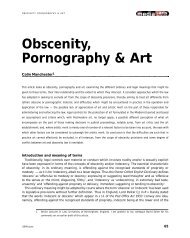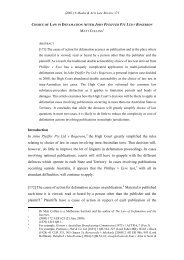Recent controversy over Phillip Gwynne's book Deadly, Unna? and ...
Recent controversy over Phillip Gwynne's book Deadly, Unna? and ...
Recent controversy over Phillip Gwynne's book Deadly, Unna? and ...
You also want an ePaper? Increase the reach of your titles
YUMPU automatically turns print PDFs into web optimized ePapers that Google loves.
Gray, ‘Imagination, Fraud <strong>and</strong> the Cultural Protocols Debate’<br />
arguably reversed, but traditional indigenous cultures recognise the importance of the<br />
[35] individual artist, just as Western European culture recognises the importance of<br />
tradition. The privileging of originality in European culture has, however, ‘functioned<br />
to marginalise or deny the work of many creative people: women, non-Europeans,<br />
artists working in traditional forms <strong>and</strong> genres, <strong>and</strong> individuals engaged in group or<br />
collaborative projects, to name but a few.’ 58<br />
To regard negotiation with indigenous people <strong>over</strong> the content of a <strong>book</strong> or film as a<br />
form of censorship rests upon a privileging of ‘originality’ <strong>over</strong> tradition. The <strong>book</strong> or<br />
film could not exist without the pre-existing tradition. This may be true in all contexts,<br />
whether involving indigenous people or not: but what makes the circumstances<br />
different where indigenous material is involved is the historical inequality <strong>and</strong><br />
powerlessness of indigenous people whose cultures are represented by others. This<br />
arguably justifies reversing the privileging of originality <strong>over</strong> tradition, at least<br />
temporarily, in order to attain the <strong>over</strong>riding right of ‘equal concern <strong>and</strong> respect.’ 59 In<br />
the legal sphere this would require a reversal of the idea–expression dichotomy in<br />
intellectual property law, temporarily <strong>and</strong> for the purpose of <strong>over</strong>coming the existing<br />
legal discrimination. Such an approach would require statutory amendment in order to<br />
protect traditional cultural expressions, at least if Kirby J’s interpretation of the<br />
concept of native title is not ultimately accepted by the High Court. 60 Where cultural<br />
protocols are concerned, however, the path to acceptance of indigenous perspectives<br />
is easier. The argument based on privileging provides an intellectual justification for<br />
the cultural protocols already in existence, <strong>and</strong> a relatively powerful response to the<br />
frequent protests from non-indigenous creators that such protocols amount to<br />
censorship.<br />
58 P Jaszi <strong>and</strong> M Woodmansee, ‘The Ethical Reaches of Authorship’ (1996) 95(4) South Atlantic<br />
Quarterly 947, 948, quoted in Barron, ibid 39.<br />
59 A right regarded even by the liberal legal philosopher Dworkin as of primary importance in the<br />
liberal scheme of rights: see, for example, discussion in H Davies <strong>and</strong> D Holdcroft, Jurisprudence:<br />
Texts <strong>and</strong> Commentary (1991) 313–4.<br />
60 See Western Australia v Ward (2002) 191 ALR 1.



![ERIN O'DWYER [92] Introduction Striking a balance between ...](https://img.yumpu.com/14667367/1/184x260/erin-odwyer-92-introduction-striking-a-balance-between-.jpg?quality=85)


